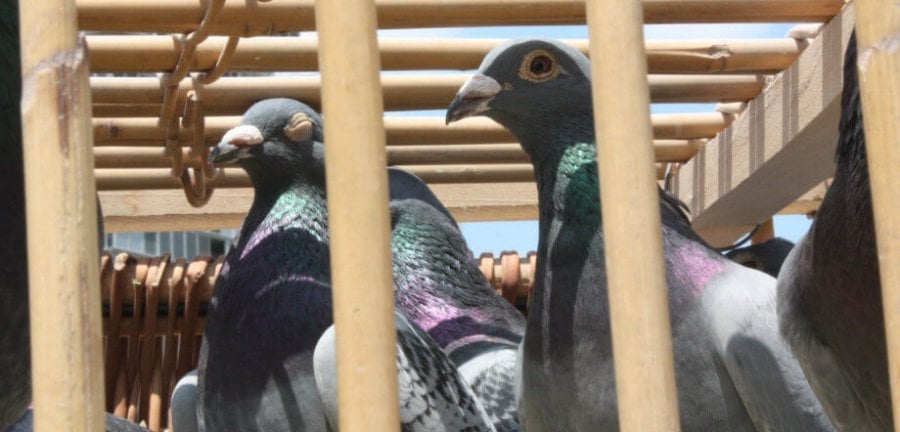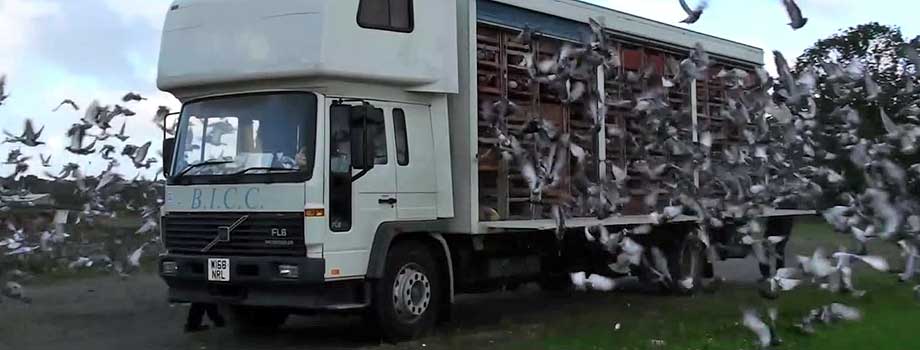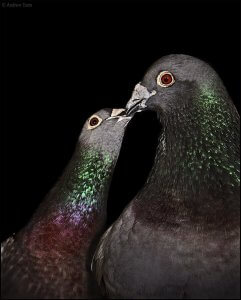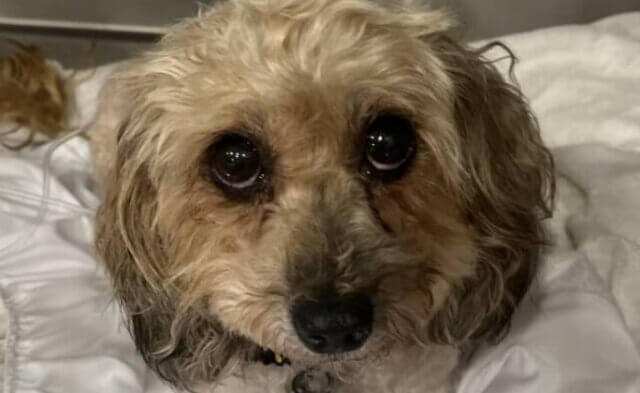This article was originally printed in PETA’s Augustus Club newsletter for our legacy society members.
Pigeons are among the smartest and most physically adept animals on Earth. Their hearing and vision are both excellent and have been used to save lives in wartime and to help find sailors lost at sea. A study showed that pigeons can even learn abstract numerical rules—something that until recently, we thought only humans and other primates could do.
And talk about relationship goals: Not only are pigeons monogamous and devoted to their mates for their entire lives, mother and father birds also share the parental duties equally.
Pigeons are rock doves, a symbol of peace, and they deserve to be left in peace. Yet, millions are exploited and killed by humans every year. Fortunately, with the help of Augustus Club members, PETA is able to come to their defense.
Racing for Their Lives
Through groundbreaking exposés on three continents, PETA has blown the lid off a blood sport that most people are unfamiliar with, even though it’s carried out all over the world: pigeon racing.
As the exposés have revealed, pigeon racers in the U.S. and the U.K. exploit the birds’ strong family bonds in order to motivate them to fly as fast as possible. In a technique appallingly called “the widowhood method,” pigeons are separated from their mates and babies and then transported hundreds of miles away before being set loose. The frantic birds fly as fast as they can—often through extreme weather—to return to their families.
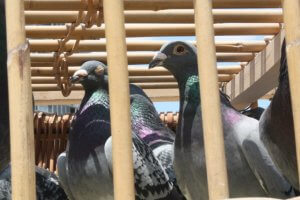
In the U.S., pigeon racing is a multimillion-dollar illegal gambling industry in which more than 60 percent of the birds die or never return. In the U.K., the death toll in many races—particularly those across the treacherous English Channel—is almost 90 percent.
While Taiwan’s pigeon-racing industry uses only young birds who have not yet mated, the races are no less cruel—in fact, they’re the world’s deadliest. The young birds are sent out to sea and released from cargo ships, regardless of weather conditions—even during typhoons. This forces them to try to fly home over open ocean with no land in sight, meaning that they have nowhere to land when exhaustion overcomes them. Race seasons consist of seven events spaced one week apart. Often, only about 1 percent of the pigeons complete the entire series. People are not betting on a race—they’re betting on which birds can endure torture the longest without dying.
In response to pressure from PETA, authorities have begun to crack down on this illegal and ruthless “sport.” A PETA investigation brought about the first-ever charges and conviction in the U.S. related to pigeon racing, including a no-contest plea by the executive director of the American Racing Pigeon Union. And following the investigation in Taiwan, police raided numerous pigeon-racing clubs across that country (including the largest one), seized millions of dollars in apparently illegal gambling proceeds, and charged 164 people with gambling offenses.
PETA is the only animal rights group investigating this issue, and we’re also working to stop other forms of abuse inflicted on these birds.
Urban Wildlife
In cities and suburbs, people often regard pigeons as “nuisance animals” and poison birds whose only “crime” is inhabiting areas that meet their basic needs—water, food, and a place to nest. Poisoning them is not only cruel but also a very ineffective way of resolving the perceived conflicts. As long as areas remain attractive or accessible to them, more animals will simply move in from surrounding areas to fill the newly vacant niches, resulting in a perpetual, vicious cycle of killing.
PETA has a long record of persuading communities all across North America to adopt nonlethal methods of controlling pigeon populations. Wildlife specialists work with municipal authorities, landowners, and property management companies to use exclusion techniques, such as sealing or screening lofts and eaves, and deterrent devices, such as wire coils or slanted panels to discourage roosting.
Movie Props, Flying Targets, and Classroom Corpses
PETA is also a leader in persuading film, television, and advertising professionals to enact policies against the use of animals, including pigeons. PETA exposés of the conditions inside a variety of facilities, from animal suppliers to those used by the film and television industries, have caused media firestorms. At one supplier, an employee told an eyewitness that completely conscious pigeons were decapitated as a method of killing them. With support from Augustus Club members, PETA has persuaded numerous directors and producers to replace the use of live animals with computer-generated imagery and other animal-friendly filmmaking techniques.
If you’ve never heard of a “pigeon shoot,” consider yourself lucky. At these events, people gun down birds who are set free after having been starved for several days. Fortunately, PETA has helped get most pigeon shoots stopped in the U.S., including the biggest one in the country, atwhich some PETA staffers were even arrested and sent to jail for running out onto the field to block the shooters and rescue the birds.
Pigeons are also among the many species harmed and killed by the dissection industry. A new PETA video exposé shows workers at a classroom-dissection supplier drowning fully conscious pigeons in a vat of water. As a result, the company is facing multiple charges of cruelty to animals. PETA has persuaded countless schools to replace animal dissection with virtual-dissection software, and this exposé will bolster the campaign even further.
What You Can Do
Please help stop any plans in your community to use lethal methods to control pigeon populations. You can find suggestions for humane pigeon deterrents at PETA’s website HelpingWildlife.com.

